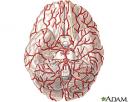Transient ischemic attack

 Alternative names: Mini stroke; TIA; Little stroke
Alternative names: Mini stroke; TIA; Little stroke
Definition: A transient ischemic attack is a “mini-stroke” caused by temporary disturbance of blood supply to an area of the brain, which results in a sudden, brief decrease in brain function.
In a TIA, the blood supply is only temporarily blocked. For example, a blood clot may dissolve and allow blood to flow normally again. A TIA is different than a small stroke. The symptoms of TIAs go away in less than 24 hours, usually less than one hour. TIAs do not show lasting changes on CT or MRI scans. (Small strokes do show changes on such tests.) TIAs are like warnings that a true stroke may happen in the future if something is not done to prevent one.
Atherosclerosis (“hardening of the arteries”) is a condition where fatty deposits occur on the inner lining of the arteries. This condition dramatically increases the risk for both TIAs and stroke. Approximately 80-90% of people who have a stroke due to atherosclerosis had a TIA episode before.
Symptoms
Symptoms of TIA are the same as those that occur in stroke and include the sudden development of:
- Numbness, tingling, changes in sensation
- Weakness, heavy feeling of extremities
- Speech difficulty (garbled speech; slurred speech)
- Vision changes (Loss of vision in one eye, Decreased vision, Double vision)
- Sensation that the person or the room is moving (vertigo)
- Loss of balance
- Lack of coordination
- Gait changes, staggering
- Falling (caused by weakness in the legs)

